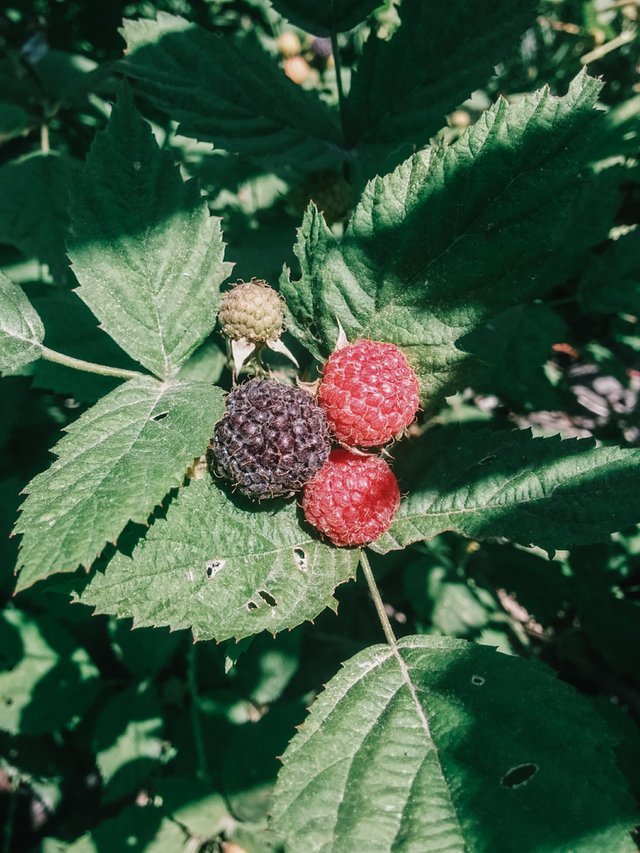
The Blackcap Raspberries are fresh in my mind for two reasons. We just finished one of our few precious pints of wildcrafted Blackcap Raspberry jam from last year! -- And now there are Blackcap Raspberry vines just sprouting in the greenhouse!
After fermenting, cleaning and drying the seeds I had put aside from last year's harvest I put a bunch out into a pot to sit out in the cold all winter -- Raspberry seeds require a few months cold stratification period to sprout (you can also stratify them in the fridge).
Since raspberries produce on second year canes, it will be two years before this year's grown-from-seed raspberries fruit. Then why am I growing raspberry canes from seed?
- I can start a lot more raspberry canes for a lot less money than buying from a nursery.
- Propagating from seed ensures genetic diversity.
- This particular variety is wild and therefore theoretically more resilient than cultivated varieties.
- Its fun and I am learning a lot about propagating plants from seeds.
These little babies just popped up and are complete with tiny fuzzy little raspberry thorns. Aren't they cute? @nateonsteemit was our first customer that purchased Blackcap Raspberry seeds from us earlier this winter. I wonder if his are coming up yet!
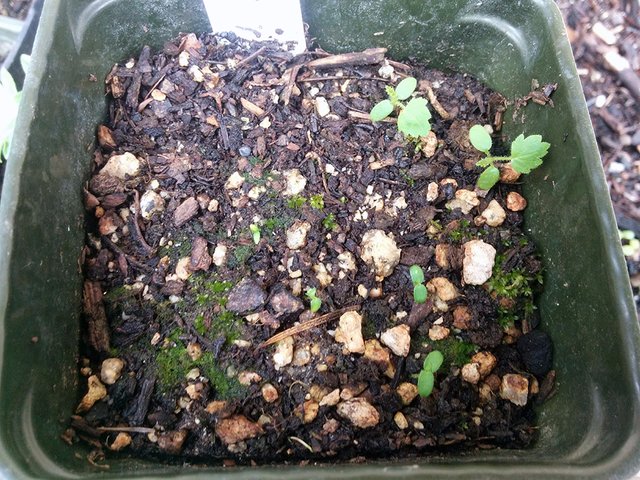
Blackcap Raspberry – Rubus leucodermis
Life cycle: Perennial / Ease of propagation: Difficult / Hardiness zone: 3-7 / Requires: Cold Stratification
This Blackcap Raspberry is a treat to harvest. The berries are extremely sweet, soft and delicious. The dark reddish purple, almost black color is a fun twist on the red raspberry that I am used to. I discovered several patches of Blackcap raspberries in our local mountains and decided they were worth propagating based on flavor alone. It was also fun to see the wild raspberries thriving at the edge of the forest setting and producing berries in summer through late summer with no extra irrigation beyond the winter and spring rain that nature provided. That’s not to say Raspberries are drought tolerant because they enjoy soil moisture and soil acidity. Regardless these Blackcap raspberries are doing well in our hot dry summers and do just fine in heavy clay soil – a testament to the raspberry’s resiliency and the forest’s capacity to nurture.
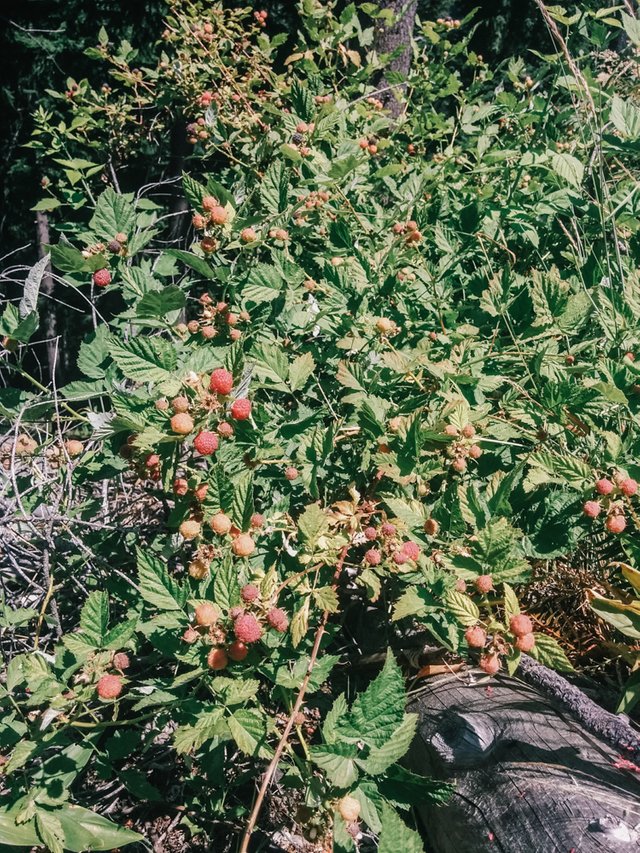
I do quite enjoy these Blackcap Raspberries. I find their flavor more intense than cultivated raspberries. I wonder if it is their nature or the fact that they grew in the wild with less irrigation. They are so good eaten out of hand. I enjoy them fresh but they make wonderful jam, no sugar needed. They also make a delicious wine or vinegar. Eat them as you would eat any other raspberries.
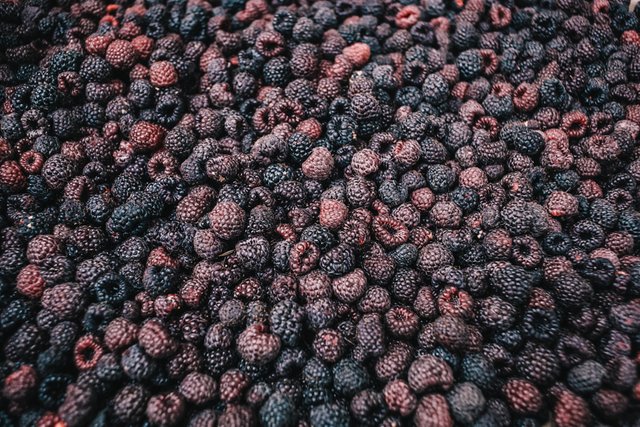
Raspberry seeds need cold stratification so there is a little effort and attention to get them started. Once they are established in your garden they are quite resilient. Like other raspberries the Blackcap fruits on second year canes, so you can train and prune Blackcap canes the same way you would other raspberries.
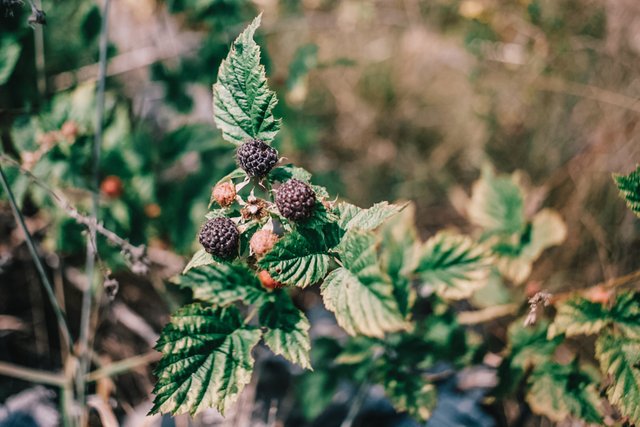
However it should be noted that Black raspberries cane multiplying behavior is less vigorous than red raspberries. Black raspberries shoots are somewhat more sparse and will not stray as far from the root crown as red raspberries; Black raspberry shoots come from the crown, whereas red raspberry shoots come further out of the root system. So black raspberries may be of interest if less vigorous spreading is desired. However if you want to encourage more spread of your Blackcap raspberries you can let the fully grown canes bend down and tuck them into the soil, known as tip layering, where the shoots will sprout new roots. This is one way which the black raspberries propagate in the wild. You can call them walking raspberries.
Raspberry leaves are astringent and can be prepared in teas and infusions. Raspberry leaf infusion helps improve fertility in both men and women. Beyond that there are many reproductive benefits for women who drink raspberry leaf infusions.
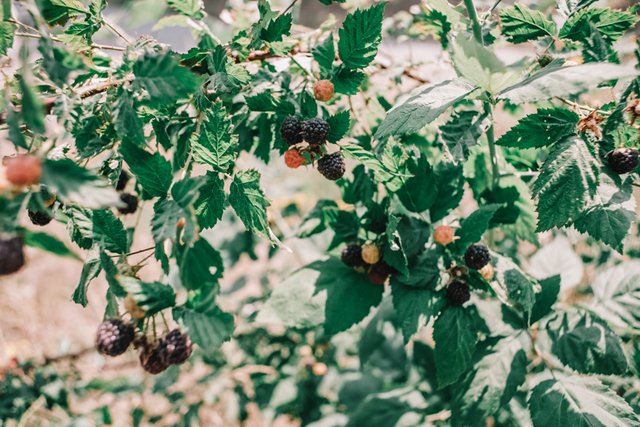
“Brewed as a tea or as an infusion, raspberry is the best known, most widely used, and safest of all uterine and pregnancy tonic herbs. It contains fragrine, an alkaloid which gives tone to the muscles of the pelvic region, including the uterus itself […] The benefits of drinking a raspberry leaf brew before and throughout pregnancy include: Increasing fertility in both men and women […] Preventing miscarriage and hemorrhage […] Easing of morning sickness […] Reducing pain during labor and after birth […] Assisting in the production of plentiful breast milk […] Providing a safe and speedy pariuntion”
– Susun Weed, Herbal Allies for Pregnancy Problems
“A mild uterine astringent, reliable and safe both for excessive menstrual bleeding (a tablespoon of leaves in tea every three hours) and during pregnancy to prevent spotting in the first trimester and to increase muscle tone in the uterine walls (two to three cups a day for the duration). If drunk after childbirth, it will help decrease uterine swelling and cut down on postpartum bleeding.”
– Michael Moore, Medicinal Plants of the Mountain West
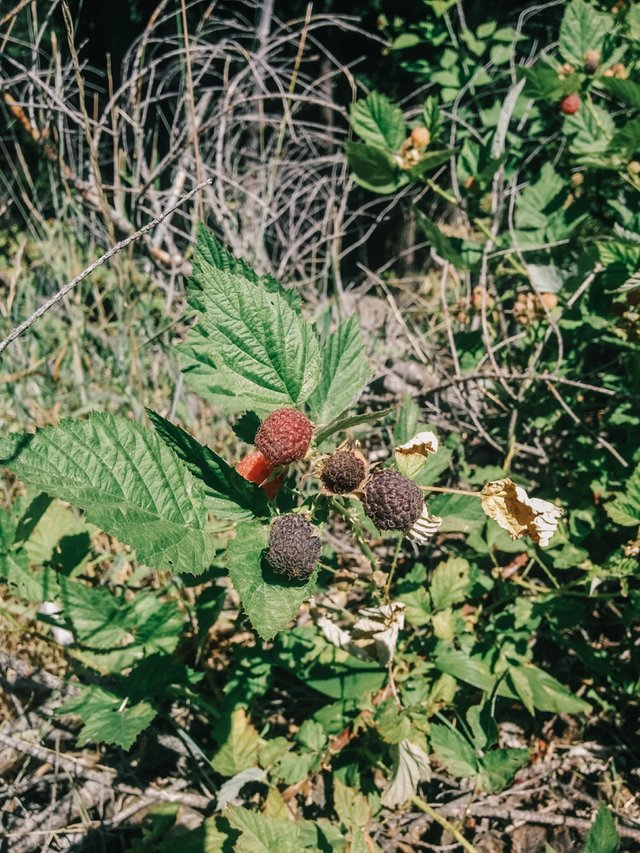
Sowing Instructions
Seeds require 3 months cold stratification. Sow in pots/trays and keep slightly moist but not sopping wet through the winter and watch for germination in spring/summer. Alternatively stratify the seeds in the refrigerator in moist but not sopping sphagnum moss or coconut coir for three months and then place in pots or trays. Once sprouts are large enough, prick out into their own pots. Transplant in the fall or the following spring.
References
- The Backyard Berry Book, Stella Otto
- Herbal Allies for Pregnancy Problems, Susun Weed
- Medicinal Plants of the Mountain West, Michael Moore
- https://pfaf.org/user/plant.aspx?latinname=Rubus+leucodermis
Blackcap Raspberry Seeds are available for STEEM, SBD and USD
View our entire Seeds of Abundance seed catalog at Homesteaders Co-op
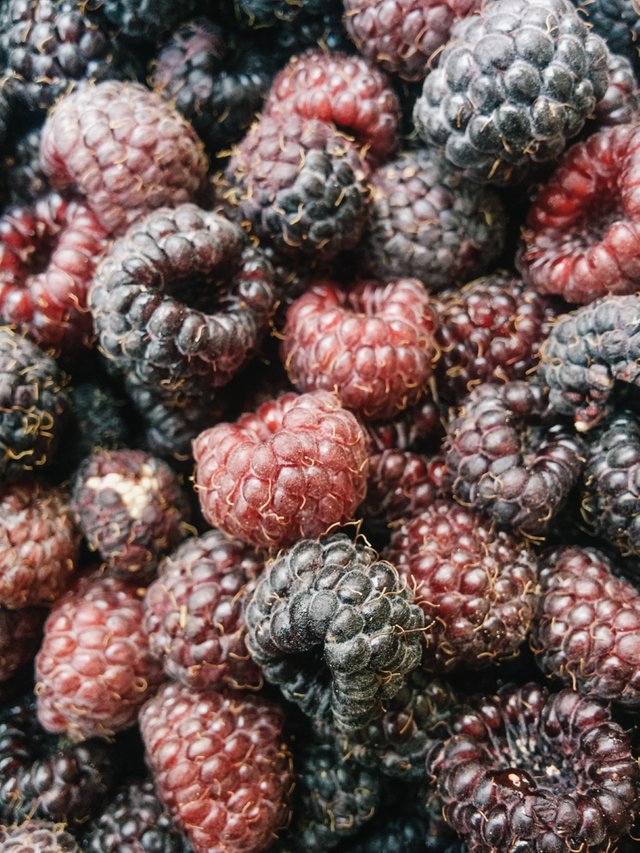

Website | @homesteaderscoop | Discord Community

#naturalmedicine | Introducing @naturalmedicine | Discord Community

#ghsc | Introducing @ghscollective | Discord Community

#tribesteemup | @tribesteemup | The 8 Pillars of TribeSteemUp
Those little babies are so sweet. Yum yum! What wonderful wild nutritious healing & nourishing food! #foodisfree🍇
Downvoting a post can decrease pending rewards and make it less visible. Common reasons:
Submit
Yes!! Thanks for reminding me of the #foodisfree tag.. I should use it more often!
Downvoting a post can decrease pending rewards and make it less visible. Common reasons:
Submit
I love the native ones that grow in Western WA! And of course the cultivars are really good too! Thanks for sharing!
Posted using Partiko Android
Downvoting a post can decrease pending rewards and make it less visible. Common reasons:
Submit
Awesome! I didn't seen the native ones in Western WA- I've only seen blackberries there when I was on the WA coast. These are in SW OR so I Imagine they may be very similar :)
Downvoting a post can decrease pending rewards and make it less visible. Common reasons:
Submit
Yeah, the blackberries are all over. The black raspberries are a bit harder to find but I really love them. First time I found out about them was when I was out on a solo backpacking hike in the Olympic Mountains and I came across a large patch on the trail that no one was eating. After I setup camp I hiked all the way back to the patch so I could get a bunch--made for a great desert that day! :)
http://nativeplantspnw.com/blackcap-raspberry-rubus-leucodermis/
Downvoting a post can decrease pending rewards and make it less visible. Common reasons:
Submit
Wow what a large distribution range! Its nice that we can both enjoy these yummy raspberries.. haha I bet that they were worth the hike!
Downvoting a post can decrease pending rewards and make it less visible. Common reasons:
Submit
They love to grow on forest edges here so as soon as my trees get a bit bigger I plan to plant a bunch all over. Can't wait to get to harvest them at my own place! :)
Downvoting a post can decrease pending rewards and make it less visible. Common reasons:
Submit
Cool! Maybe collect some seeds from your wildcrafting this fall to stratify and in a few years when the trees get bigger you'll have some strong vines to transplant :)
Downvoting a post can decrease pending rewards and make it less visible. Common reasons:
Submit
Good idea! :)
Downvoting a post can decrease pending rewards and make it less visible. Common reasons:
Submit
Great article!
I have tons, so need no seeds, but the majority of mine are either self-sown or from naturally occurring tip layering.
Our original plant was either bird- or mouse-sown, and came up from under our covered front porch, so they are resilient indeed, and quite determined. ;-)
Fabulous raspberries, great flavor and resilience, and well worth growing.
I should note that I'm on the Highland Ridge of the Cumberland Plateau, in the foothills of the Appalachians, and not the PNW.
Downvoting a post can decrease pending rewards and make it less visible. Common reasons:
Submit
Wow what a great story about how raspberries joined you and came into your garden :) How nice that you embraced it and went with it :)
Downvoting a post can decrease pending rewards and make it less visible. Common reasons:
Submit
Yeah, I've nicknamed them the "Volunteer" raspberries, since this is the Volunteer State, and I've now got over a dozen babies that I'm planning to use to create a living fence near the front of our property.
And I'm hoping, once they're in full sun, that the berries will be even sweeter!
Posted using Partiko Android
Downvoting a post can decrease pending rewards and make it less visible. Common reasons:
Submit
My favorite!
Downvoting a post can decrease pending rewards and make it less visible. Common reasons:
Submit
Love it! I'm about 85% sure I have tons of those all over! I'll have to check Sunday and send you pictures!!!
I put em in the north garden like they're ground cover. :)
Downvoting a post can decrease pending rewards and make it less visible. Common reasons:
Submit
Woo! yay! I'll have to wait patiently until they fruit :P Hopefully we are both on steem in 1 1/2 years from now so I can see!
Downvoting a post can decrease pending rewards and make it less visible. Common reasons:
Submit
I also dehydrate raspberry leaves to feed the hens in the winter, just 1 of the 42+ herbs/forbs/flowers I do for them.
Downvoting a post can decrease pending rewards and make it less visible. Common reasons:
Submit
That is really smart!! Very cool. We don't have chickens yet but I will keep that in mind for the future. We do enjoy dried raspberry leaves prepared as an infusion and drink it regularly.
Downvoting a post can decrease pending rewards and make it less visible. Common reasons:
Submit
Making sure the hens have all they need to lay well during the winter is what we do here. Can't afford to feed organic feed and not get eggs to sell.
Downvoting a post can decrease pending rewards and make it less visible. Common reasons:
Submit
That would certainly lower your feed costs!! I love that you have found a system to grow the food that works for you :) I might have to pick your brain on that sometime if I end up with chickens :)
Downvoting a post can decrease pending rewards and make it less visible. Common reasons:
Submit
I'd be glad to share what I've learned about feeding chickens, when the time comes. :))
Downvoting a post can decrease pending rewards and make it less visible. Common reasons:
Submit
Those little sprouts are so cool! We let some of our cane tips rest on the ground and propagate that way. I imagine that growing some from seed is good to for more diversity of your raspberry plants. Thanks for sharing this.
Downvoting a post can decrease pending rewards and make it less visible. Common reasons:
Submit
Awesome! It is amazing how they can propagate themselves and spread and multiply :)
Downvoting a post can decrease pending rewards and make it less visible. Common reasons:
Submit